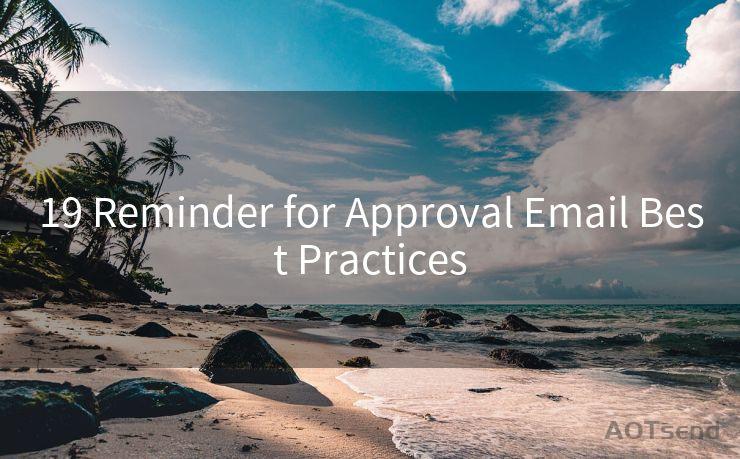19 Reminder for Approval Email Best Practices




When it comes to business communication, approval emails play a crucial role. These emails are often the gateway for decisions that can make or break projects, initiatives, and even careers. To ensure your approval emails are effective and efficient, here are 19 best practices to keep in mind.
1. Clear and Concise Subject Line
Start with a subject line that summarizes the request and its urgency. For example, "Urgent Approval: Marketing Budget for XYZ Campaign."
2. Formal Greeting
Always begin with a formal greeting, addressing the recipient by their proper title and name. This sets a professional tone for the email.
3. Introduction
Briefly introduce the purpose of the email. For instance, "I am writing to seek your approval for the attached marketing plan."
4. Detailed Explanation
Provide a detailed yet concise explanation of what you're seeking approval for. Include relevant background information and the reasons behind the request.
5. Attachments and Links
If there are any attachments or links to documents that support your request, mention them clearly. Ensure these files are named appropriately and are virus-free.
6. Call to Action
Explicitly state what action you expect from the recipient. For example, "Please review the attached document and provide your approval by [specific date]."
7. Deadline
Always include a clear deadline for the approval, allowing enough time for the recipient to review the request.
8. Contact Information
Provide your contact information in case the recipient has any questions or needs further clarification.
9. Professional Tone
Maintain a professional and respectful tone throughout the email. Avoid colloquial language or informal greetings.
10. Proofreading
Always proofread your email for grammar and spelling errors. A poorly written email can reflect poorly on your professionalism.

11. Follow-Up Plan
If you don't receive a response within a reasonable timeframe, have a follow-up plan in place. This could include a reminder email or a phone call.
12. Avoid Unnecessary Details
Stick to the point and avoid including irrelevant information that might distract from the main request.
13. Use Templates
If you frequently send approval emails, consider creating a template to save time and ensure consistency.
14. Consider Privacy
Be mindful of sharing sensitive information. Use secure methods to share confidential documents.
15. Be Prepared for Questions
Anticipate possible questions and have answers ready to expedite the approval process.
16. Show Appreciation
Thank the recipient for their time and consideration, even before they've responded.
17. Use a Professional Email Signature
Include a professional email signature with your contact details and, if relevant, your company logo.
18. Test Email Delivery
🔔🔔🔔
【AOTsend Email API】:AOTsend is a Managed Email Service for sending transactional emails. Support Email Types: reminders, authentication, confirmations, notifications, verification codes, invoices, password resets, account activations, billing statements, two-factor authentication (2FA), and one-time passwords (OTP) emails, etc. $0.28 per 1000 Emails. 99% Delivery, 98% Inbox Rate.
You might be interested in:
Why did we start the AOTsend project, Brand Story?
What is a Managed Email API, How it Works?
Best 25+ Email Marketing Platforms (Authority,Keywords&Traffic Comparison)
Best 24+ Email Marketing Service (Price, Pros&Cons Comparison)
Email APIs vs SMTP: How they Works, Any Difference?
Occasionally test your emails to ensure they're not being flagged as spam or facing other deliverability issues.
19. Close with a Call to Action
Reiterate the call to action at the end of the email to reinforce the urgency and importance of the request.
By following these 19 reminders for approval email best practices, you can increase the efficiency and effectiveness of your business communications, ensuring timely responses and smoother workflows.




Scan the QR code to access on your mobile device.
Copyright notice: This article is published by AotSend. Reproduction requires attribution.
Article Link:https://www.mailwot.com/p6925.html



